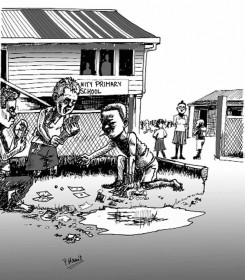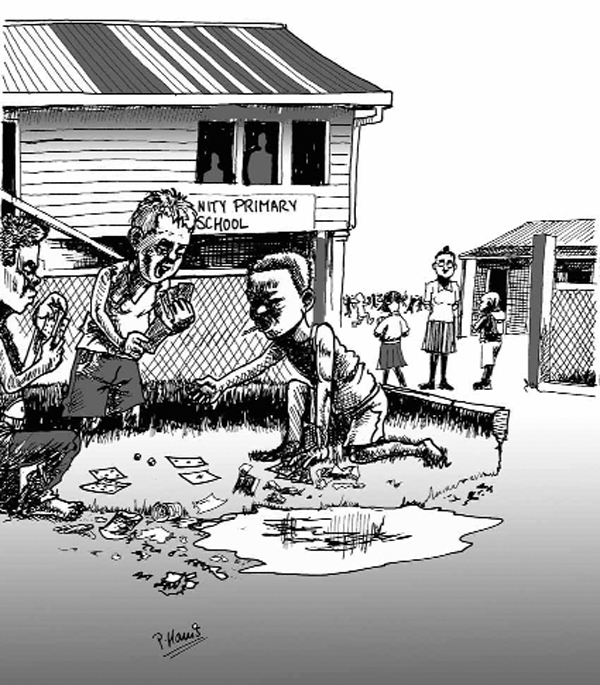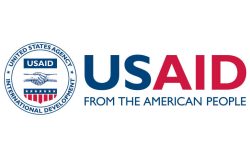Issues and challenges in the new academic year (Cont’d)
In the days leading to the publication of this issue The Guyana Review spoke with a number of teachers and with an education administrator about the problem of discipline in schools. All of them agree that it is one of the most menacing challenges facing the school system.
 Ask any teacher whether or not not they feel “in control” of their charges within the setting of the school and you are unlikely to get an unequivocal “yes” for an answer. Indeed, many of them will openly admit that coping with indiscipline in schools is one of the foremost challenges of the teaching profession. The offences are many and varied and can range from minor classroom or playground altercations to incidents of violence that require the intervention of the police.
Ask any teacher whether or not not they feel “in control” of their charges within the setting of the school and you are unlikely to get an unequivocal “yes” for an answer. Indeed, many of them will openly admit that coping with indiscipline in schools is one of the foremost challenges of the teaching profession. The offences are many and varied and can range from minor classroom or playground altercations to incidents of violence that require the intervention of the police.
But the challenges associated with maintaining discipline often go well beyond isolated incidents of aggression. There have been re-ports of violent gangs, sexual activity on school premises and in at least a handful of cases, the sale of drugs in schools.
If these occurrences are hardly unique to the local school system, many teachers admit that they feel “intimidated” and “fearful,” their feelings of insecurity arising in many cases out of a concern that the standard of discipline in our schools is on a continual downward spiral.
“We have lost that aura of authority that had once been associated with the relationship between children and their teachers,” a senior secondary school mistress says. “We have lost our authority as much to the parents as to their children. In many cases we are no more than wirnesses to their delinquency,” she added.
The Ministry of Educa-tion has created a ‘rule book’ that outlines the range of offences and attendant penalties, the extremes of which include expulsion and even prosecution. The Senior Mistress says however that “no amount of rules can be effective where the mechanisms for enforcement very often do not exist.” She says that while teachers really ought to be the “instruments of enforcement” they have lost their authority to what she describes as “a society that thrives on rebellion against authority.” She too, is aware of drugs being sold in “a particular school” without any intervention from the authorities. “The authorities” in this case are neither the ministry nor the police but the teachers themselves; and, she says, “the teachers are afraid to intervene.”
While the prevailing view appears to be that most children remain mindful of the authority which their teachers weild, there is a fear that increasing numbers of children are becoming aggressive, confrontational, even violent.
Another teacher at a city school says that the accustomed classroom disruption by mischievous and hyperactive children to which teachers have grown accustomed and learnt to manage, has in some cases become unmanageable, often des-cending into classroom confrontations that require intervention beyond the class teacher. She recalls one case towards the end of the last academic year in which a putrid battle among dozens of schoolcgildren had to be quelled by residents of the community since, fearing for their own safety, most of the teachers refused to intervene.
If the Ministry of Educa-tion is less than forthcoming on the battle to retain control of schools, some officials privately admit that they cannot assert with a clear conscience that the authorities are winning. One official supports the view that the rules themselves are under threat from children who are unmindful of consequences. “It may surpreise you to know that the really indisciplined children are really in the minority by a long way. The problem is that a few indisciplined children are capable of disrupting an entire school if they really get going,” the official says.
No one who was interviewed for the purpose of this story is entirely sure as to exctly where the blame is to be placed for worsening standards of discipline in schools. Most, however, say that deviant behaviour in schools has to be blamed, first and foremost, on examples that abound in the wider society. “What happens in the homes and on the streets will inevitably find its way inside the schoolroom,” an experienced primary school teacher says. He has stuck with the profession “purely for the love of it,” and claims to have witnessed “all sorts of shocking incidents” of deviant behaviour.
Issues of discipline have also become a battle of wills between parents whom the Senior Mistress describes as “dangerous and confrontational” and who reject the authority of the school, specifically the notion that their children should be punished for wrongdoings. As a consequence, teacher/parent and children/teacher confrontations that lead to serious injury and police intervention are not uncommon in our schools. Indeed, there have been cases in which children and their parents have cast such a serious shadow of intimidation over the wider school community that teachers and other parents have insisted on the relocation of the children.
One teacher who says that she has made a study of parental aggression in the school setting says that some parents actually flex their muscles as a means of publicly demonstrating to their children that their own authority exceeds that of the school. “Children whose parents are bullies thrive on their parents’ reputations and are able to exempt themselves from punishment knowing that their parents are prepared to intervene violently on their behalf. Those are the worst ones since their misdeeds often go without punishment.”
The schools begin at a decided disadvantage. There are no discipline-related criteria for children’s entry into schools and whatever potential disruprion or danger they present, they must be admitted and tutored. There are cases, one teacher says, “where parents honestly have no academic expectations of their children. They send them to school because it is the done thing.” The upshot of this, he says, is that the children themselves “are hazy” about their reason for being in school. “They believe that school is just a means of killing time and that they are therefore not required to conform to any rules and regulations. Any attempt to discipline them results in confrontational responses.”
At the other end of the spectrum some parents openly admit that they have lost control of their children. “In those cases, the teacher says, “they appear to expect that the school will remedy all of the vices that their children have inculcated outside the school.”
The focus by the Ministry of Education on the parent/teacher partnership is designed to have parents play a greater role in their children’s education. The rationale is that if parents can be encouraged to regard themselves as stakeholders in their children’s education they are more likely to seek to ensure conformity with the rules. Arising out of this there has been a greater institutionalized focus on Parent/Teacher Associations (PTAs) in which parents have been assigned positions of administrative and organizational responsibility.
“The approach has been highly successful in some cases,” says the Headteacher of a Georgetown primary school. In some cases parents have supported schools well in terms of fund-raising, discipline and ensuring the completion of homework. I believe that the success has a lot to do with the role that Heads of schools have played in encouraging parents to become actively involved in some aspects of school administration.
However, the feedback from teachers suggest that PTAs often tend to work less well in some working class communities where parents either see no role for themselves in the school community because of their own academic underachievement or else, where their preoccupation with their work pursuits is tendered as an excuse for not becoming involved with PTAs. One response to the latter problem has been to encourage parents to pursue basic remedial classes and even to organize some of those classes for them. This too has not always worked since some parents are reluctant to make their own limitations public.
The Georgetown Headmistress says that she believes that parents’ involvement in PTAs should be made mandatory. “No one expects that all of them will be there all of the time. At least, however, if we can get parents to demonstrate some level of interest in the PTA it makes it easier for us to manage their children.” The ministry is ptobably unlikely to embrace that idea.
The notion of strengthening the network of PTAs as an additional management mechanism has the support of the ministry in the form of a special department responsible for overseeing PTAs. The authority of the PTA, however, remains strictly limited and parents’ involvement remains
optional.
If the role of the teacher in maintaining discipline in the immediate classroom and playing field settings remains critical, some teachers say that supervising indisciplined, hostile and violent children adds significantly to their routine responsibilities and, all too often, brings them into conflict with parents. Teachers, they say, are sufficiently burdened with the responsibility of delivering teaching in an environment in state schools which is often less than hospitable. Dealing with “out of control” children is a significant additional responsibility. Moreover, one teacher says, “when we see the examples of incidents in which our colleagues are assaulted and sometimes injured we become more aware of the importance of our own safety.”
How to protect the school system from the taint of indiscipline that afflicts the wider sociery remains an as yet unmet challenge in an environment where resources are scarce. “I am particularly worried about the schoolgirls who have reached puberty and who are sexually active, sometimes with the knowledge and even the consent of their parents,” the Senior Mistress says. I don’t know how many people outside of the school system know how many firls become pregnant and are forced to terminate their education and how many of them contract STDs. There seems to be nothing that the authorities can do about grown men who prey on school girls and, of course, where the parents turn a blind eye to those relationships there is really little that the school can do.” She talks about what she describes as “the new breed of parent,” many of whom, she says, “are children themselves and really do not have the slightest idea about bringing up a child. Sometimes the upbringing of that child becomes mostly the teacher’s responsibility.”
Her other great concern, she says, is drugs in schools. “What is disturbing about the sale of drugs in schools is that it ponys to organised arrangements that go beyond the children themselves. What that means is that the drug gangs too may have infiltrated our schools. If that is the case then we are really in serious trouble.”










